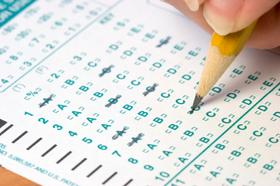If your student attends public school, you are undoubtedly familiar with standardized testing. Standardized testing is designed to determine the effectiveness of a school’s curriculum and teaching staff as well as the degree to which students understand core concepts.
Many schools engage in standardized testing once a year or more in grades 3 through 8, focusing particularly on subjects like math, science, and language arts. Though these tests are partially designed to measure the effectiveness of a school program, they are also used to determine funding for public schools – this puts a lot of pressure on schools to ensure that their students perform well.
With so much riding on these tests, it is no wonder that many students develop test anxiety. Anxiety over testing can turn even the smartest, most intelligent student into an F student. But what is text anxiety and how do you deal with it? Keep reading to find out.
What is Test Anxiety?
According to the American Test Anxiety Association, test anxiety is a psychological condition in which students experience extreme distress before, during, and/or after a test or exam. This level of stress makes it difficult for the student to do their best work – it even causes some students to freeze up entirely and to forget everything they’ve learned. As many as 20% of school children have severe test anxiety and another 18% have a more moderate form of the condition. Understanding what test anxiety is and how it affects students is important for both parents and teachers. Keep reading to receive tips for easing test anxiety in students.
How to Ease Test Anxiety in Students
Test anxiety can cause even the smartest of students to fail academically – this is one of the problems with standardized testing, but that is another issue. This form of anxiety can impact different students in different ways, but there are a number of things parents and teachers can do to help. Here are some simple tips for easing test anxiety:
- Let students unload their thoughts on paper before the test. When a student experiences test anxiety, there are likely to be all kinds of negative and worrisome thoughts spinning around his head. According to a report published in Science magazine, giving students time to unload their thoughts on paper significantly increased testing performance. If a student is able to express his worries and his distracting thoughts on paper, he may be able to better focus on the test.
- Encourage relaxation exercises before testing. Anxiety is largely a psychological issue and it can sometimes become so severe that a student is unable to think about anything else – it can even cause students to forget things that they have learned. By allowing students to engage in relaxation exercises like deep breathing before a test, it can help them to relax so they are able to focus properly on the test set before them.
- Help your student develop effective study habits. Another way to ease test anxiety is to help students develop effective study habits so they can enter the test feeling confident about their understanding of the material. Make sure that your student has a quiet, comfortable place to study and set aside a little time for his studies every day. Encourage your student to take notes and to make flash cards to help with memorization – you might even encourage him to form or join a study group with other students. Just keep in mind that every child learns in a different way. S, adjust your child’s study habits to suit his learning style.
- Try taking practice tests in a similar environment. People tend to be more comfortable doing things that feel familiar – this extends well beyond the realm of academics. It only makes sense, then, that giving your student a chance to take a practice exam might help him feel more comfortable on the day of the actual test. It is best if you can recreate the conditions of the test exactly, so parents may need to work with teachers to make this happen.
This video describes how test anxiety impacts grades.
5. Don’t be afraid to take a break during the test. The key to managing test anxiety during a test is to remain calm. If you feel yourself starting to become worried or distracted, step back and take a few deep breaths to calm yourself before you continue the test. If deep breathing doesn’t work, try tensing your muscles for a hold of 5 seconds then relax and repeat the sequence three times. It may also help for you to close your eyes and visualize a calm, relaxing place.
6. Always read the instructions thoroughly. Many students rush through the instructions when they take a test, often missing small but important bits of information. Encourage your student to spend some time carefully reading the instructions before they even start to complete the test. The better the student understands what the test is asking, the better he’ll be able to perform. And make sure that your student knows it is okay to ask the teacher a question during the test if he doesn’t understand the question being asked.
7. Have scrap paper available during the test. For mathematics tests, it makes sense to give students scrap paper they can use to work out problems. Having a sheet of paper available during the test can be valuable in other subjects as well. One thing that might help students with test anxiety is encouraging a “brain dump”. At the very beginning of the test, encourage students to write down all of the key facts and tidbits of information they can think of on the scrap paper so they won’t forget it during the test.
8. Take your time! Finally, encourage your students to take their time in completing the test. Adding a time limit to the test can increase test anxiety for some students, so make sure your students know what they have plenty of time to complete the test. If necessary, make alternative arrangements for anxious students to take the test without time limits.
This video from We Are Teachers explains test anxiety from the teacher's perspective.
In addition to following these simple tips, your student should take care of him or herself in the days leading up to the test. Though studying for a test can be stressful, it is important that you still take time for yourself. Make an effort to get a good night’s sleep during the week of the test so you’ll be rested and focused when it comes time to take the test. You should also try to eat healthy foods that will support your energy level and your cognitive abilities. And don’t forget to get some exercise as well – it will help you feel better and think more clearly.
If you have a child or student who consistently performs poorly on tests despite good grades on homework assignments, it could be a case of test anxiety. Test anxiety affects even the smartest, most gifted students and it isn’t something you should scoff at. Follow the tips provided above to help ease test anxiety in your student or child so he or she can reach their full academic potential.
Questions? Contact us on Facebook. @publicschoolreview














